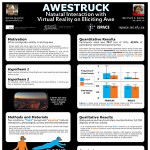How can we use immersive VR to give people pivotal positive experiences without having to send them out into space?
“We went to the Moon as technicians, we returned as humanitarians” reflected Edgar Mitchell after his space flight. This describes the overview effect – a profound awe-inspiring experience of seeing Earth from space resulting in a cognitive shift in worldview, leading to a more conscious and caring view on our planet. Experiencing Earth from space first-hand made many astronauts realize that Earth is fragile, without borders, leading to a feeling of connectedness to humanity and our planet(see astronauts’ quotes). Such an awareness shift could have a positive impact on our society and planet, especially if we had a tool that allowed for more people to experience it without the risk, cost, and environmental footprint associated with actual space flight.
To pursue this dream, the iSpace Lab investigates how we could best use the potential of immersive virtual reality to give people a glimpse of the overview effect without having to send more rockets to space. At the same time, we use virtual reality as a tool allowing us to better understand the experience and underlying triggers of the overview effect phenomenon.
To this end, we
(1) design a set of introspective, physiological and behavioural evaluation research tools to better understand the overview effect phenomenon and how immersive VR could serve to induce it;
(2) Pilot these research tools as an essential part of our larger research program through the creation of a VR environment, gaining a deeper understanding of aspects of the personal experiences of the OE delivered through VR, and as a result deriving strategies for the design of pivotal VR experiences with the long-term goal of inducing positive social change in the population.
In case you are interested in collaborating on this project, please contact Bernhard at b_r@sfu.ca.
Below is our first video explaining the overall idea of the Earthgazement project. Thanks: IAT344 student team Joanna Chou, Katarina Shao, Lien Chou, & Sidi Zhong!

since 2019 we worked on designing a VR experience and an accompanying study that assesses the potential of such a purposefully designed VR experience to mitigate some of the negative psychological effects arising from living in isolation and experiencing sensory deprivation.
And here is a short project video from Denise about an experiment from November 2016, where she designed a mixed-methods experiment to measure levels of introspective and physiological awe in participants while they explored Earth in Google Earth VR with a HTC Vive. Results indicated that indeed, participants were awed by the content and medium. Below is a short project video and poster for a 2-page extended abstract that received the best poster prize at the IEEE Symposium on 3D User Interfaces (as part of IEEE VR) in March 2017:
http://ispace.iat.sfu.ca/wp-content/plugins/zotpress/
37904
Quesnel, D., & Riecke, B. E. (2017). Awestruck: Natural Interaction with Virtual Reality on Eliciting Awe. 205–206. https://doi.org/10.1109/3DUI.2017.7893343
http://ispace.iat.sfu.ca/wp-content/plugins/zotpress/
apa
37904
Quesnel, D., & Riecke, B. E. (2017). Awestruck: Natural Interaction with Virtual Reality on Eliciting Awe. 205–206. https://doi.org/10.1109/3DUI.2017.7893343

Click to view Poster
Denise was recently featured on a Voices of VR podcast on “Researching Awe with Google Earth VR: Towards a Virtual Overview Effect”
here’s a great video explaining the bigger picture of the overview effect and how it matters (by the planetary collective — thanks!)
Katerina recently gave an overview presentation on our earthgazement project in SIAT’s research colloquium that we recorded, her talk starts at 1:09:55 [please excuse sound issues due to WiFi interference… ]
Denise also recently gave a short talk exploring the methods we could use to measure if participants might really experience awe and an overview effect in VR. Her talk is entitled: “Are you awed yet? Objective and subjective indicators of awe, using virtual reality content” [Denise’ talk starting at 32:46]
Related Publications
http://ispace.iat.sfu.ca/wp-content/plugins/zotpress/
37904
Quesnel, Denise T., and Bernhard E. Riecke. 2017. “Connected Through Awe: Can Interactive Virtual Reality Elicit Awe for Improved Well-Being?” Poster presented at the 3
rd Annual Innovations in Psychiatry and Behavioral Health: Virtual Reality and Behavior Change, Stanford University, CA, USA, October 6.
https://med.stanford.edu/cme/courses/2017/psychiatry17.html.
(Download)
37904
Miller, Noah, Ekaterina R. Stepanova, John Desnoyers-Stewart, Ashu Adhikari, Alexandra Kitson, Patrick Pennefather, Denise Quesnel, et al. 2023. “Awedyssey: Design Tensions in Eliciting Self-Transcendent Emotions in Virtual Reality to Support Mental Well-Being and Connection.” In Proceedings of the 2023 ACM Designing Interactive Systems Conference, 189–211. DIS ’23. New York, NY, USA: Association for Computing Machinery. https://doi.org/10.1145/3563657.3595998.
37904
Kitson, Alexandra J., Ekaterina R Stepanova, Ivan Abdo Aguilar, Natasha Wainwright, and Bernhard E Riecke. 2020. “Designing Mind(Set) and Setting for Profound Emotional Experiences in Virtual Reality.” In
Proceedings of the Designing Interactive Systems (ACM DIS) Conference. Eindhoven, Netherlands: ACM.
https://dis.acm.org/2020/.
(Download)
37904
Kitson, Alexandra, Elisabeth Buie, Ekaterina Stepanova, Alice Chirico, Bernhard E. Riecke, and Andrea Gaggioli. 2019. “Transformative Experience Design: Using Interactive Technologies and Narrative to Support Transformative Experiences.” In
ACM CHI 2019 Special Interest Group, 1–4. Glasgow, United Kingdom: ACM.
(Download)
37904
Kitson, A., Riecke, B. E., & Gaggioli, A. (2019). Digital Wellbeing: Considering Self-transcendence.
ACM CHI 2019 Workshop on “Designing for Digital Wellbeing,” 1–4.
https://digitalwellbeingworkshop.wordpress.com/position-papers/ (Download)
37904
Quesnel, Denise, Ekaterina R. Stepanova, Ivan Aguilar, Patrick Pennefather, and Bernhard E. Riecke. 2018. “Creating ‘AWE’: Combining Artistic Intuition and Research-Based Design for an Emotionally-Profound Art Installation.” In
2018 IEEE Games, Entertainment, Media Conference (GEM) (Full Paper), 1–8. Galway, Ireland: IEEE. https://doi.org/10.1109/GEM.2018.8516463.
(Download)
37904
Quesnel, Denise, Steve DiPaola, and Bernhard E. Riecke. 2018. “Deep Learning for Classification of Peak Emotions within Virtual Reality Systems.”
International SERIES on Information Systems and Management in Creative EMedia (CreMedia), no. 2017/2 (January), 6–11.
http://www.ambientmediaassociation.org/Journal/index.php/series/article/view/274.
(Download)
37904
Quesnel, Denise, and Bernhard E. Riecke. 2018. “Are You Awed Yet? How Virtual Reality Gives Us Awe and Goose Bumps.” Frontiers in Psychology 9:1–22. https://doi.org/10.3389/fpsyg.2018.02158.
37904
Stepanova, Ekaterina R., Denise Quesnel, Alexandra Kitson, Mirjana Prpa, and Bernhard E. Riecke. 2017. “Virtual Reality as a Tool for Inducing and Understanding Transformative Experiences.” Poster presented at the Psychonomic Society 58
th Annual Meeting, Vancouver, BC, Canada, November.
(Download)
37904
Quesnel, D., & Riecke, B. E. (2017).
Awestruck: Natural Interaction with Virtual Reality on Eliciting Awe. 205–206. https://doi.org/10.1109/3DUI.2017.7893343
(Download)
37904
Riecke, Bernhard E. 2017. “Could Virtual Reality Make Us More Human?” Talk presented at the TEDxEastVan, Vancouver, BC, Canada, September 16.
https://www.ted.com/talks/bernhard_riecke_could_virtual_reality_make_us_more_human_jan_2017.
37904
Quesnel, Denise T. 2017. “Evoking Deep Connections by Embodying Another’s Reality.” Talk presented at the TEDxESFU, Vancouver, BC, Canada, November 12.
https://youtu.be/xsRzjUoSbE0.


